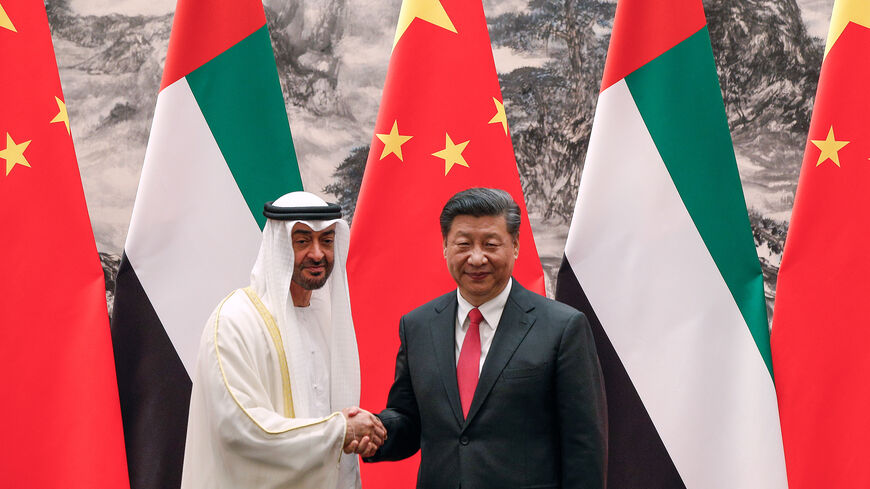DUBAI — The United Arab Emirates (UAE) and Kuwait were granted dialogue partner status in the Shanghai Cooperation Organization (SCO) on Friday, according to a statement from the organization, further boosting China's inroads in the Arab Gulf region.
Emirati minister of foreign affairs and international cooperation, Sheikh Abdullah bin Zayed Al Nahyan, highlighted his country's shared common goals with the organization.
“In the coming period, the UAE will seek to make significant strides in its engagement with the SCO and its member states. As a people and country, we are delighted at being welcomed as a dialogue partner in an organization whose global influence and importance only continue to grow,” he said, according to the state-owned Emirates News Agency.
What happened: The UAE and Kuwait signed memorandums granting them dialogue partner status in the SCO on Friday, which took place on the sidelines of the organization’s Council of Foreign Ministers meeting in Panaji, India, on May 4-5.
The two Gulf states made up half of the new partners at the meeting. The other two countries were the Maldives and Myanmar.
Kuwait’s ambassador in New Delhi, Jassim Al Najem, said this is the first step to becoming a full member.
“This move is in line with Kuwait’s key foreign policy objectives, because trade, economic cooperation, global supply chain and food and energy security are among the areas that Kuwait attaches great importance to,” he said, as reported by the state-owned Kuwait News Agency.
He highlighted Kuwait’s goal in enhancing internal and external security with the SCO and keenness to participate in anti-terrorism strategies as part of the security bloc.
Background: The SCO was created in 2001 to counter US hegemony in the region, and it expanded later to include India and Pakistan.
Egypt, Qatar and Bahrain were welcomed to the organization as a dialogue partner in September 2022, during the organization's annual summit that took place in Samarkand, Uzbekistan. Iran joined as a full member at that time, after its approval the year before.
In late March, Saudi Arabia's Cabinet approved a decision to join the SCO, inching another step closer to China despite concerns from its traditional ally — the United States.
Why it matters: SCO dialogue partner status allows the countries to take part in specialized intra-SCO events at the invitation of the member states, according to the organization’s website.
The SCO is a political and security union that spans Eurasia and includes China, India and Russia. It is seen as a geopolitical counterweight to the United States and Western powers.
Earlier this year, Saudi Arabia joined the SCO and its growing ties with Beijing have raised concerns with Washington.
Emily Hawthorne, senior Middle East analyst at the US-based Risk Assistance Network and Exchange, does not view this move as Saudi Arabia choosing a side but rather it not picking one.
“It’s really important to not view this as [the kingdom] abandoning or purposefully weakening any ties to the United States,” she told Al-Monitor in March, adding that Washington remains Riyadh’s main security guarantor.
Know more: Saudi Arabia is seemingly looking to diversify its global partnerships in the same way that it has been diversifying its economy into non-oil sectors and reducing its dependence on one single source.
In the same vein, five Arab countries were among 19 that expressed interest in joining the BRICS group (Brazil, Russia, India, China, and South Africa) last month, according to Bloomberg. The five countries were Saudi Arabia, Algeria, Egypt, Bahrain and the UAE.
BRICS is a club of emerging market economies that are seen to compete with the G-7, an intergovernmental political forum made up of Canada, France, Germany, Italy, Japan, the United Kingdom and the United States.
Iran, which holds the world's second-largest gas reserves, applied to join the BRICS group last year. The organization that was formed in 2006 only added one new member — South Africa — in 2010.
Gulf countries continue to maintain strong security ties with the United States, particularly when it comes to arms acquisitions. The United States, the world’s top arms exporter, was the largest exporter to the Middle East and North Africa and accounted for 54% of weapons sold to the region from 2018 to 2022, according to a report published by the Stockholm International Peace Research Institute.


f0eb.jpg)





